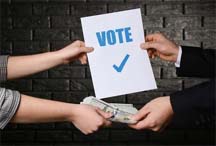Ekiti: From dollar to naira rain
WITH Social Media churning out new levels of awareness, one expected something different at the last Ekiti gubernatorial elections. It did not happen. We are all back to the French saying, the more things change, the more they remain the same.
The Youth who complain so bitterly all year long, disappointed even themselves by joining the dirty but lucrative business of ‘See and Buy.’ For the uninitiated, this is the slang for Vote Buying. In Ekiti, the transaction was done in naira.
Voter turnout was so poor that of 988,923 registered voters, 360, 753 came out to vote. This represents about 36.5 percent of eligible voters. It turned out to be the lowest in the state since 2003 when turnout was 43.5 percent. In 2014, it was 49.1 percent, falling to 44.4 percent in 2014.
The Internet is awash with jingles and cartoons creating a new order. You have comments running into hundred of thousands and likes gaining more numbers. I did not see that translate to votes. This false social media impression means so much.
I have a feeling that some voters frequent Internet polling booths and stay away from the real deal. Candidates should therefore weigh their options and change strategy. Voting goes beyond Social Media hints. To hit hard, supporters must leave their phones and move to the field.
This voter apathy tickles some buyers. The less the number, the more money to save. There were allegations that parties were sharing money, between three to ten thousand naira per delegate. If a candidate was ready with nine billion naira for about one million voters, he would keep part of it since less than 400,000 voted.
The business is booming because there are willing buyers and sellers. In Ekiti, those who did not travel to Abuja as party delegates, thereby missing the millions of dollars that went round, got their share at home.
In law, both the giver and taker of bribes are guilty of corruption. The Nigeria Police sent Deputy Inspector General Babatunde Kokumo to maintain law and order. Supported by other security agencies, he made promises.
Kokumo said: “Our men should look out for electoral offenders. Any infraction of the Electoral Act will be frowned upon. Offenders will be arrested and followed up with prosecution.”
So far, only two arrests were reported. We are still waiting for prosecution. It was an open secret that ‘See and Buy’ happened. If the security agencies were unable to apprehend as many offenders as possible, there is no way this business will not grow like Yahoo Yahoo.
We need a new Nigeria Youth Movement. There was one in 1937 that had young men like Ernest Ikoli, Samuel Akinsanya and Hezekiah Davies. Earlier, Prof. Eyo Ita had ignited an awakening in Calabar.
When Herbert Macaulay led men like Dr. Adeniyi Jones, Egerton Shyngle and Karimu Kotun to form the Nigeria National Democratic Party on 1922, they did not go about sharing money to a willing electorate. Love for country was their driving force.
Those who say vote buying has come to stay because of the battered economy tend to forget that even in the 1930s, the economy was bad as well. The Governor of Nigeria, Donald Cameron (1931-1935) could not get a job for his son. Nigerians were not so cheap.
Politicians had different ways of wooing and keeping supporters. In Ibadan, Adegoke Adelabu made sure his crowd, many of whom did not understand one word of English language, enjoyed a ride in his official car as a Minister.
Chief Obafemi Awolowo took campaign to the air. He hired a chopper for his campaign in the North- East, from Numan to Jimeta and Maiduguri. Awo dropped leaflets from the air, promoting the Action Group. The Shehu of Borno complained about Awo’s papers faliing in restricted parts of his palace.
Before the end of the first republic, politicians were sharing pencils and match boxes. In the second republic, Arthur Nzeribe donated an aircraft to Dr. Nnamdi Azikiwe and his Campaign Council. Some candidates also shared bags of rice.
The fourth Republic has turned politics from Stomach Infrastructure to Dollar Economy. Many of the younger ones do not care. They have entered the black market and are being rewarded in Naira.
This development is sad. In 1954, Mathew Mbu was just 25 when he became a Federal minister. At 23, in 1952, the young man was a member of the Eastern Regional House of Assembly. Today, some 23- year olds are collecting 3,000 naira to vote.
EndSars came like whirlwind. It came to an end and everywhere is calm. Zik was not afraid of gaol during the struggle for Independence. Tafawa Balewa, Muhammadu Ribadu, Kingsley Mbadiwe, Amanze Njoku and Adelabu were young when they made the Federal cabinet in 1954.
What happened in Ekiti should touch the heart and soul of Nigerians. Winning election is beyond Tik Tok, Twitter and Facebook. There is enough naira to share but voters will suffer because the sharers will get back their money from Federal allocation.





Comments
Post a Comment